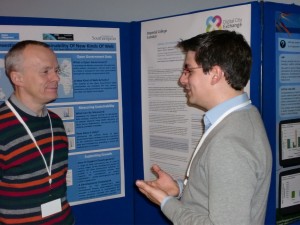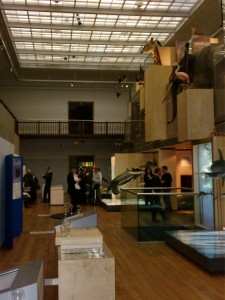Wed 16th November 2011, St. James’ Park, Newcastle
Dr John Baird (Head of RCUK’s Digital Economy programme) launched the second, annual Digital Economy All Hands meeting with an overview of UK DE portfolio, highlighting recent major investments including Digital City Exchange (£6M over 5 years) and MediaCity UK.
John took the opportunity to summarise the DE programme’s achievements to date: investment of more than £138M, funding 96 projects with 400 users since 2008. He went on to announce the four DE sub-themes – Communities and Culture, IT as a Utility, New economic models, and Sustainable Society – in the context of the DE networks call. [Other notable calls to be announced soon include Research Centres in End Use Energy Demand and Future ICT-Enabled Manufacturing]
If you’re a Computing Scientist, Engineer or Social Scientist working in DE and just getting to grips with it being ‘multidisciplinary’, its time to move on. According to John, the DE is really “post discipline”.
Wrapping up with the current DE challenges, John asked “what is the Digital Economy programme’s place in international research?”. Food for thought indeed… Unfortunately though this was the first, and last, reference to any wider, international context; a missed opportunity at a conference centering on research in the digital space, which is, by definition, geographically unbounded.
Prof James Hollan (University of California, San Diego) delivered the day 1 keynote entitled ‘History Enriched Computing’ , presenting the changing forms of computers, the notion of history-enriched digital objects and drawing parallels across the disciplines with “History is about stories, Science too is about stories…In Computer Science, we make our stories true by code; In Engineering, we make our stories true by building things”. ChronoViz was presented as an example of a data visualisation tool offering analysis capabilities and integration with paper-based notes. James went on to discuss the data collection revolution, exclaiming: “…More data can’t be the answer… We’re drowning in data”. For James, the future of Science lies in linking these data and these disciplines.
The keynote was an impressive showcase of existing tools but, instead, I was hoping for the presentation of a ‘grander vision’. When you are itching to discover what aspects of the Digital Economy, for example the US and Asia, are focusing upon, I was left searching for a global reference point to ground our DE research.
Themes emerging from the industry panel session with Gary Moulton (Microsoft), Ian Marshall (from the perspective of the Financial Services industry), Dr Aart van Halteren (Philips Research), Dr Alan Whitmore (from the perspective of the pharmaceutical industry), Dave Sharp (Binary Asylum) and Chaired by Prof Feng Li (SiDE Digital Economy research Hub ) included:
- barriers to the use of products, programmes and services, the Connected Living Report and the growing importance of middle-aged women in product and service development and the adoption of technologies.
- the challenges associated with the pace of change vs the arthritic nature of infrastructure.
- the barriers to getting digital solutions to end-users and the need for sustainable solutions and real progress in Business Model Innovation.
- Open Innovation encompassing industry-academia collaborations.
The standard delegate list is often the key to maximising your networking during conference breaks and workshops. Was anyone else wondering where the list, for ‘Digital Engagement’, was hiding?
The ‘How to share mobile trace data to enable applications in the transport sector’ workshop – co-presented by Prof Derek McAuley (Director, Horizon Digital Economy research Hub), Prof Eddie Wilson (University of Southampton), Prof Nigel Davies (Lancaster University) and Dr Dominic Price (Horizon Digital Economy research Hub) – touched on intelligent traffic lights, experiences with collecting user traces, privacy issues associated with personalised travel advice with crowd-sourcing approaches, technology constraints (such as battery life), and prototyping data stores. Nigel welcomed opportunities to collaborate on developing a common platform for storing and re-purposing participant’s journey data. Meanwhile, Dominic invited more people to use the Geostore – less of an application, and more an infrastructure for research projects with multiple trials.
Highlights of the rest of the day’s activities included: Dr Silvia Elaluf-Calderwood’s (Information Systems and Innovation Group, London School of Economics) talk on ‘Digital Innovation on Mobile Platforms: A Business Model Analysis’; reference to MIT’s Senseable City Lab; and the research poster session.
Digital City Exchange’s Orestis Tsinalis presented our poster (low resolution) [jpg] (and paper [pdf]) to a curious bunch in the atrium of the Great North Museum.
And the prize for the conference’s first mention of an “ecosystem” went to Silvia!
More news from Day 2 to follow…

